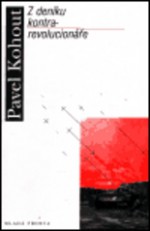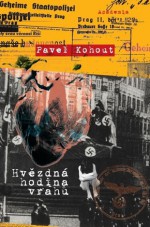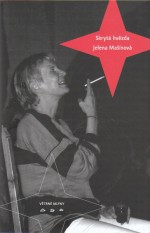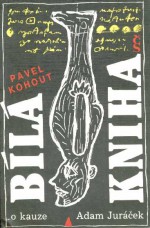Dramatist, novelist, poet, screenplay writer and translator. One of the most frequently translated writers, he was forced to emigrate in 1978 and in 1980 became an Austrian citizen. He was awarded the Austrian Waldviertel Academy prize. He was born on 20 July 1928.
Pavel Kohout

Tango mortale
| Title | Publisher | Year | Selected published translations | Awards |
|---|---|---|---|---|
| The White Book on the Adam Juráček affair (Bílá kniha o kauze Adam Juráček) | Větrné mlýny | 2014 | DE | EN | |
| The Extinction of Trilobites in Bohemia (Zánik trilobitů v Čechách) | Mladá fronta | 2014 | ||
| I'm Snowing (Sněžím) | Větrné mlýny | 2013 | ||
| Tango mortale | Pistorius & Olšanská | 2012 | DE | |
| The Hidden Star of Jelena Mašínová (Skrytá hvězda Jelena Mašínová) | Větrné mlýny | 2011 | ||
| My Life with Hitler, Stalin and Havel (Můj život s Hitlerem, Stalinem a Havlem) | Academia | 2011 | ||
| Dramas and Farces Economics (Dramata a frašky ekonomie) | Pistorius & Olšanská | 2011 | ||
| From the View of Trilobit (Z pohledu trilobita) | Pistorius & Olšanská | 2010 | ||
| War on the Third Floor (Válka ve třetím poschodí) | Radioservis | 2010 | ||
| The Stranger and the Beautiful Woman (Cizinec a krásná paní) | Pistorius & Olšanská | 2009 | DE | |
| About Nothing and About Everything (O ničem a o všem) | Pistorius & Olšanská, Academia | 2008 | ||
| Five and Pat (Pět a Pat) | Větrné mlýny | 2008 | ||
| The Noose (Smyčka) | Pistorius & Olšanská | 2008 | ||
| It was My Life? (To byl můj život?? (1. a 2. díl)) | Paseka, Pistorius & Olšanská | 2005 | DE | |
| Four and Cyrano!! (Čtyři a Cyrano!!) | Větrné mlýny | 2005 | ||
| The White Book on the Adam Juráček Affair against Sir Isaac Newton (Bílá kniha o cause Adam Juráček... contra sir Isaac Newton) | Paseka | 2005 | DE | |
| Four and Cyrano!! (Čtyři a Cyrano!!) | Větrné mlýny | 2005 | ||
| Foreign Feathers Shine (Lesk cizího peří) | Paseka | 2003 | ||
| Games in Bed (Hry v posteli) | Paseka | 2001 | ||
| The Long Wave After the Keel (Ta dlouhá vlna za kýlem) | Paseka | 2000 | ||
| He Woman She Man (Ten žena a ta muž) | Mladá fronta | 1999 | ES | |
| Six und Sex (Šest a sex) | Mladá fronta | 1998 | ||
| From the Diary of a Conter - Revolutionary or Lives from Tank to Tank (Z deníku kontrarevolucionáře) | Mladá fronta | 1997 | ||
| End of the Summer Holidays (Konec velkých prázdnin) | Mladá fronta | 1996 | ||
| The Widow Killer (Hvězdná hodina vrahů) | Mladá fronta | 1995 | ES | EN | |
| I´m Snowing (Sněžím) | Český spisovatel | 1993 | ||
| Dance and Love Lessons (Hodina tance a lásky) | Československý spisovatel | 1992 | ||
| Saint Clare´s Ideas (Nápady svaté Kláry) | Mladá fronta | 1991 | ||
| The White Book on the Adam Juráček Affair (Bílá kniha o kauze Adam Juráček) | Československý spisovatel | 1991 | DE | EN | |
| Life in the Quiet House (Život v tichém domě: Tři aktovky se společným jmenovatelem) | Dilia | 1990 | ||
| The Wretched Murderer (Ubohý vrah) | Dilia | 1990 | ||
| Katyn (Katyně) | Československý spisovatel | 1990 | ||
| Where the Dog is Buried (Kde je zakopán pes) | Atlantis | 1990 | ||
| Dance and Love Lessons (Hodina tance a lásky : německá romance) | Index | 1989 | ||
| Briefe uber die Grenze (Briefe über die Grenze) | Wegner | 1968 | ||
| August August, august (August August, august) | Dilia | 1967 | ||
| The White Book on the Adam Juráček Affaire (Bílá kniha o kauze Adama Juráčka) | Československý spisovatel | 0 | DE | EN | |
| Around the World in 80 Days (Cesta kolem světa za 80 dní) | Orbis | 0 |

The Extinction of Trilobites in Bohemia
Zánik trilobitů v Čechách

Tango mortale

My Life with Hitler, Stalin and Havel
Můj život s Hitlerem, Stalinem a Havlem

Dramas and Farces Economics
Dramata a frašky ekonomie

From the View of Trilobit
Z pohledu trilobita

War on the Third Floor
Válka ve třetím poschodí

The Stranger and the Beautiful Woman
Cizinec a krásná paní

About Nothing and About Everything
O ničem a o všem

Five and Pat
Pět a Pat

The Noose
Smyčka

It was My Life?
To byl můj život?? (1. a 2. díl)

Four and Cyrano!!
Čtyři a Cyrano!!
The White Book on the Adam Juráček Affair against Sir Isaac Newton
Bílá kniha o cause Adam Juráček... contra sir Isaac Newton

Four and Cyrano!!
Čtyři a Cyrano!!

Foreign Feathers Shine
Lesk cizího peří

Games in Bed
Hry v posteli

The Long Wave After the Keel
Ta dlouhá vlna za kýlem

He Woman She Man
Ten žena a ta muž

Six und Sex
Šest a sex

From the Diary of a Conter - Revolutionary or Lives from Tank to Tank
Z deníku kontrarevolucionáře

End of the Summer Holidays
Konec velkých prázdnin

Dance and Love Lessons
Hodina tance a lásky

Saint Clare´s Ideas
Nápady svaté Kláry

Life in the Quiet House
Život v tichém domě: Tři aktovky se společným jmenovatelem
Ubohý vrah
Pavel Kohout
The Wretched Murderer
Ubohý vrah

Katyn
Katyně

Where the Dog is Buried
Kde je zakopán pes

Dance and Love Lessons
Hodina tance a lásky : německá romance

Briefe uber die Grenze
Briefe über die Grenze
August August, august
Pavel Kohout
August August, august
August August, august
The White Book on the Adam Juráček Affaire
Bílá kniha o kauze Adama Juráčka

Around the World in 80 Days
Cesta kolem světa za 80 dní
He studied aesthetics and theatre science at Charles University in Prague. He was a staunch Communist and the author of socialist poetry, even marrying his first wife on Stalin’s birthday. In the 1960s he started to lean more towards reformist Communism and after the watershed meeting of Czechoslovak Writers in 1967 he became a prominent critic of the party. In 1969, as one of the main representatives of the so-called Prague Spring, was expelled from the party. He was one of the founders of the Charter 77 human rights group, and in 1978 he left with his third wife, the screenplay writer and novelist Jelena Mašínová, for a year’s engagement at the Burgtheatr, after which he was forbidden from returning to Czechoslovakia. He set up home in Vienna and today divides his time between Austria and the Czech Republic, and the author himself says that he feels most at home on the train between Vienna and Prague.
He became famous as the author of more than forty plays. In addition to his own works he has also dramatized Franz Kafka, Karel Čapek, Jaroslava Hašek and Jules Verne. He wrote the play Marie zápasí s anděly (Mary Fights With The Angels, 1981) about the life of the dissident Vlasta Chramostová. Ecce Constantia (1988) is about the trial of John Huss in Konstanz, and the one-act Atest (The Certifcate, 1979) features Václav Havel’s alter ego, Ferdinand Vaněk, who tries to obtain a breeder’s certificate for his dog, but is unable to get one because he is not a member of the Communist Party. The play August August, august (1967) was a success and is about a clown who dreams about Lipizzaners. Pavel Kohout’s plays have been shown now for decades on the great European stages in Vienna, Hamburg and Brussels.
After writing his first short stories Kohout wrote the novel Katyně (Katyn, samizdat Petlice edition, 1978, officially in 1990, Československý spisovatel), where Lizínka is studying at an academy for executioners – the Central College of Execution Science. This absurdly farcical parable describes the unlimited power of a totalitarian system and the ruthless practices of the state apparatus. It also looks at people’s abilities to adapt to absurd conditions.
This was followed by the allegorical novel Nápady svaté Kláry (Saint Clare’s Ideas, samizdat, 1982) about an adolescent girl with clairvoyant abilities, and his key work Kde je zakopán pes (Where the Dog is Buried, samizdat, 1987, officially by Atlantis, 1990). This Memoárromán (Memory-Novel as the author defined the book) is an autobiographical description of the origins of Chapter 77 and the title refers to Kohout’s dog which was poisoned by the secret police. Incidentally, his family have been breeding dachshunds for decades. “The whole narrative has been provocatively stylized to resemble the main character’s continuous conversation with his own dog, because most of the people around him have stopped listening to him due to fear and cowardice. ..In general the novel is detailed, authentic and open, but it is also a one-sided and subjective account of the moral failure on the cultural front following the defeat of the Prague Spring ideals. It examines the behaviour of individuals trying to defiantly preserve an intellectual continuity with democratic traditions, even at the price of persecution and humiliation,” wrote academic Miroslav Zelinský.
The novel Hodina tance a lásky (Dance and Love Lessons, first published in German in 1989, first Czech edition by Československý spisovatel 1992) opened up a new theme for the author – the Second World War (it is set in the Terezín Ghetto), to which he would later return. At the start of the 1990s Kohout worked on his novel Konec velkých prázdnin (End of the Summer Holidays, published first in German in 1990, Czech edition by Paseka, 1996), which is over 600 pages long. He drew on his own experiences to describe the lives of Czechs and Slovaks forced into exile and to survey the passing decades. Along with his screenwriter wife, Jelena Mašínová, Kohout adapted the novel into a popular television series. After the revolution, Kohout returned to the theme of the Second World War, to the political trials shortly afterwards and to descriptions of the Czech Republic today: he wrote Hvězdná hodina vrahů (The Widow Killer, Mladá fronta, 1995), the concise novel Smyčka (The Noose, Pistorius a Olšanská, 2008), the book Cizinec a krásná paní (The Stranger and the Beautiful Woman, Pistorius a Olšanská, 2009) and Tango mortale (Pistorius a Olšanská, 2012).
He also published more memoirs, the double volume Můj život s Hitlerem, Stalinem a Havlem (My Life With Hitler, Stalin and Havel, Academia, 2011) and two editions of reminiscences, Z deníku kontrarevolucionáře (From the Diary of a Counter-Revolutionary, first in German, 1969, in Czech by Mladá fronta in 1997). He writes for newspapers and magazines, and his feuilletons and commentaries have been published in anthologies.
Today he is one of the best-selling and most regularly staged Czech authors abroad.







